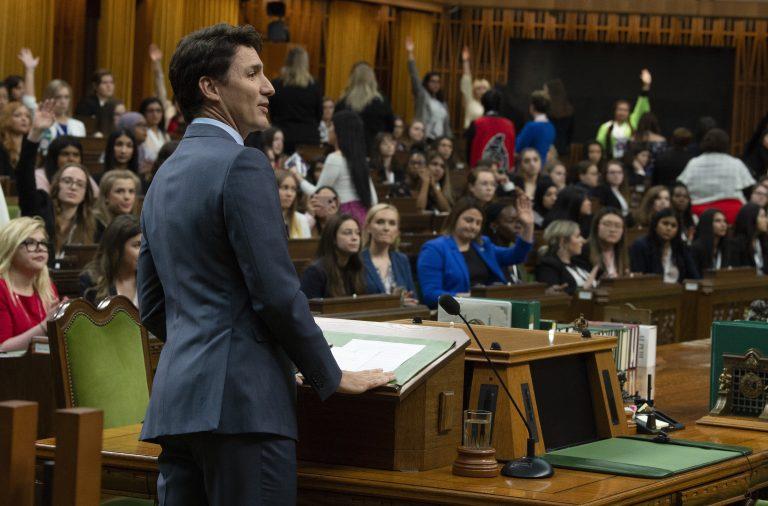One activist on her decision to shun Trudeau: ‘A refusal to sit idle’
Riley Yesno: Why absence and silence was so powerful at Daughters of the Vote

Trudeau looks to the audience for a question following his speech to Daughters of the Vote in the House of Commons on Parliament Hill in Ottawa, Wednesday April 3, 2019. (Adrian Wyld/CP)
Share
Riley Yesno is an Indigenous rights activist and writer.
“Your seat is your power. By giving up your seat you’re giving up your power”.
That’s what Maryam Monsef, Minister for Women and Gender Equality, told me and the other two dozen or so delegates from Daughters of the Vote, who protested in the House of Commons by walking out on Conservative leader Andrew Scheer and turning our backs on Prime Minister Justin Trudeau on April 3.
Run by the non-profit organization Equal Voice Canada, the Daughters of the Vote program is an initiative that brings together 338 women, gender-fluid and non-binary folk—one from every federal riding in Canada—to engage with women in politics, sit and speak in the House of Commons, and provide a platform for young leaders to have their voices amplified.
Although many of my fellow delegates and I didn’t say a word during our protests earlier this week, I think our messages were certainly heard.
The peaceful action attracted unanticipated media attention as reporters and journalists swarmed many of my colleagues following our exit from the House. The main question they wanted answered: Why?
Read more: The fall of the feminist Prime Minister
While I cannot speak on behalf of any of my peer’s individual motives, I know that some said they were prompted, at least in part, by the ejection of former ministers Jody Wilson-Raybould and Jane Philpott from the Liberal caucus.Others said they protested in response to the policies, programs, and beliefs held by Scheer and Trudeau that have violent implications for their communities; such as Scheer’s anti-2SLGBTQ+ stances on marriage equality, or the Trudeau government’s sale of weaponry to countries like Saudi Arabia and large-scale environmental offences for example. Several people simply saw others taking action, and knew that this was a time to enact meaningful allyship and show solidarity.
There is no specific or correct reason why any one of us chose to take the actions that we did, but our actions were certainly not thoughtless. For me, I didn’t know exactly what I needed to do, but the thought that I needed to do something started the moment I walked into the House of Commons
The entire day leading up to the event in the House, I felt a deep and unrelenting unease. I could not shake the fact that this setting was the same one where legislation passed that put my grandparents in residential schools for a decade.This was where laws and policies meant to assimilate me and my community, like the Indian Act and the 1969 White Papers, have been upheld and proposed as a means to effectively erase Indigenous people from society. This room is the birthplace of generations of trauma and thousands of deaths. I was never meant to be in this room and now I was about to sit in it as if it were my own.
Ultimately, I sat to cheer on my colleagues and friends, who shared their passionate and so often unheard messages. Messages spoken with such grace and power that could only be aspired to by some MPs who usually sit in those seats. Then, when it was announced that party leaders Andrew Scheer and Justin Trudeau were about to enter the house, I left.
Read more: In the abandoned ruins of Ottawa
I would not stay, uncomfortable, and passively listen to people who have and will continue to harm my community talk to me about feminism, diversity, or especially about reconciliation. Not that day, and not in an environment that was already so hard to try and claim space in.
As I watched an increasing number of people, especially fellow Indigenous people, exit the House, my remaining unease was replaced by an overwhelming sense of empowerment, and an affirmed conviction in our collective action. It was at this point that I felt as though this space had truly been made our own, if only for the moment.
Watching more and more brave and excited delegates exit the House, this was when Minister Monsef entered and told us that we had forfeited our power. I stood baffled, wondering how it was possible that we were watching the same scene unfold.
It was clear to me then, as it is now, that neither she, nor the online commenters who echo her sentiments, understand that our power does not come from any chair or presence in a room. It comes from our agency to occupy those spaces and leave them, in whatever manner, and whenever we may choose to do so.
My power does not come to me when I enter the House of Commons and relent when I exit it. My power comes from the individuals who came before me and their acts of resistance that allowed me be here in the first place. It comes from a refusal to stay idle when compelled to take action. It comes from my peers and community who rally alongside, and behind me.
Every delegate who protested, in any way, may have had different reasons for doing so. Others may take favourable or unfavourable stances on our protest. But no matter the reason we acted, and no matter what people’s opinion may be, the Daughters of the Vote proved what so many already know: That sometimes, one’s absence or silence, is more powerful than one’s presence or words could ever be.